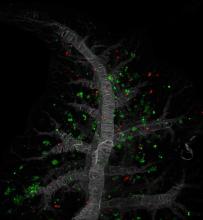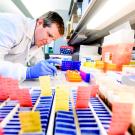News
International Nurses Day 2022: A Voice to Lead - Invest in Nursing and Respect Rights to Secure Global Health
Every year the International Council of Nurses (ICN) commemorates International Nurses Day on May 12th, the birthday of Florence Nightingale. This year’s theme: Nurses: A Voice to Lead - Invest in nursing and respect rights to secure global health is a multifaceted call to allocate resources to
Genomic Sequencing Is Changing Diagnosis, Treatment for Patients with Brain Cancer
Patients diagnosed with a type of brain tumor survived for longer when they were treated aggressively with surgery, radiation and chemotherapy. But far from suggesting that more treatment always leads to better survival, the study by UC San Francisco underscores the critical role of genomic
Further and Faster Together: Creating a Diverse Workforce
Fostering a diverse and equitable workforce poses enormous and complex challenges. It requires introspection and the hard work of culture change to undo the effects of long-term entrenched prejudice and status quo policies. Universities like UCSF and their cancer centers are increasingly taking
Joining Forces to Fight Pancreatic Cancer
Although it doesn’t tend to get as much media attention as other diseases, pancreatic cancer is the third-leading cause of cancer-related deaths and is on track to become the second most fatal cancer by 2030. It is one of the few cancers that’s becoming more common, and those who are affected have a
Renowned Hematology-Oncology Specialist to Lead UCSF Health’s Hematology-Oncology Program
UC San Francisco’s Division of Hematology-Oncology is welcoming Krishna Komanduri, MD, as division chief of Hematology-Oncology at UCSF Health. Komanduri is an international leader in the fields of hematology-oncology, transplantation, and cellular immunotherapy. He will start at UCSF on July 1. In
Valerie Weaver: A Transdisciplinary Scientist Chasing Hard Questions
In her 23 years as a scientist, Valerie M. Weaver, PhD, has overcome countless challenges – lack of funding, dismissive colleagues, and breaking ground in a new field. Recognized for her contributions, Weaver continues to show the scientific community a thing or two. In late 2021, Weaver, professor
Nutrition Counseling Program Turns 20!
This January, the UCSF Cancer Center’s Outpatient Nutrition Counseling program celebrated its 20th anniversary. This landmark anniversary is a great opportunity to look back at the origins of the Nutrition Counseling Program which presently consists of Greta Macaire, RD, MA; Anna Hom, RD, MS; Neha









